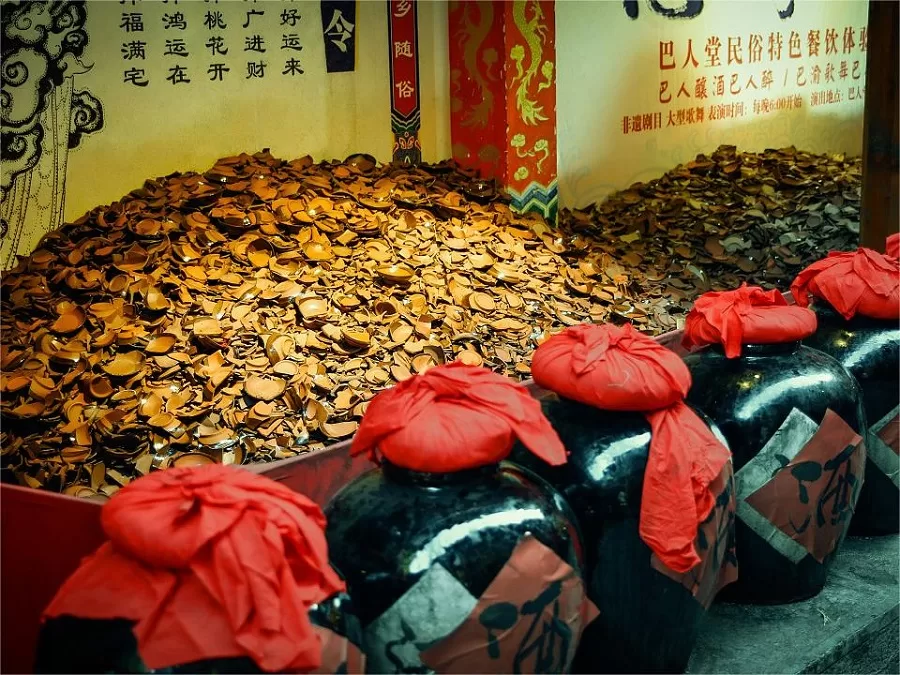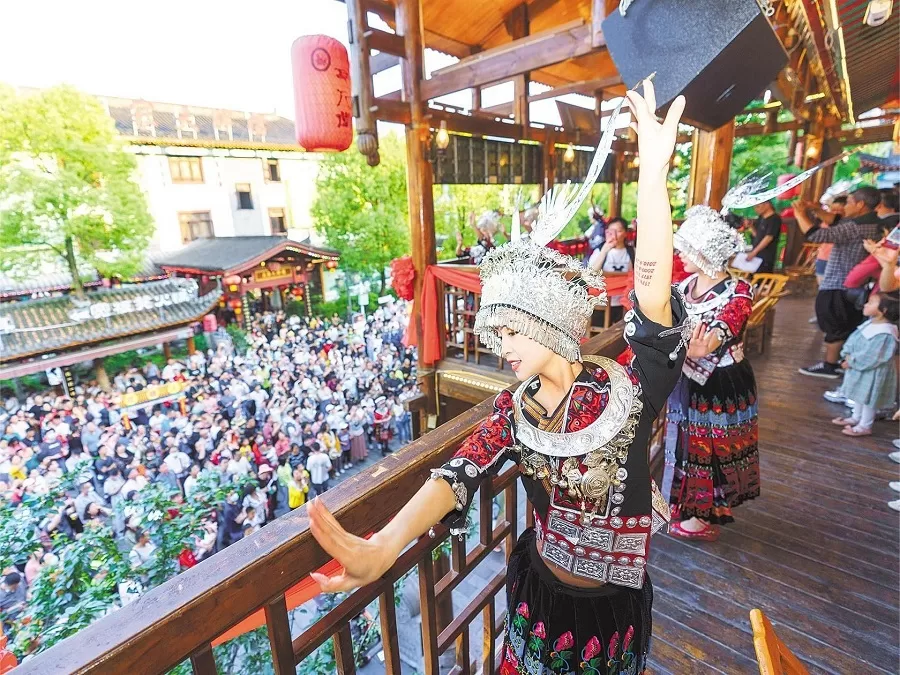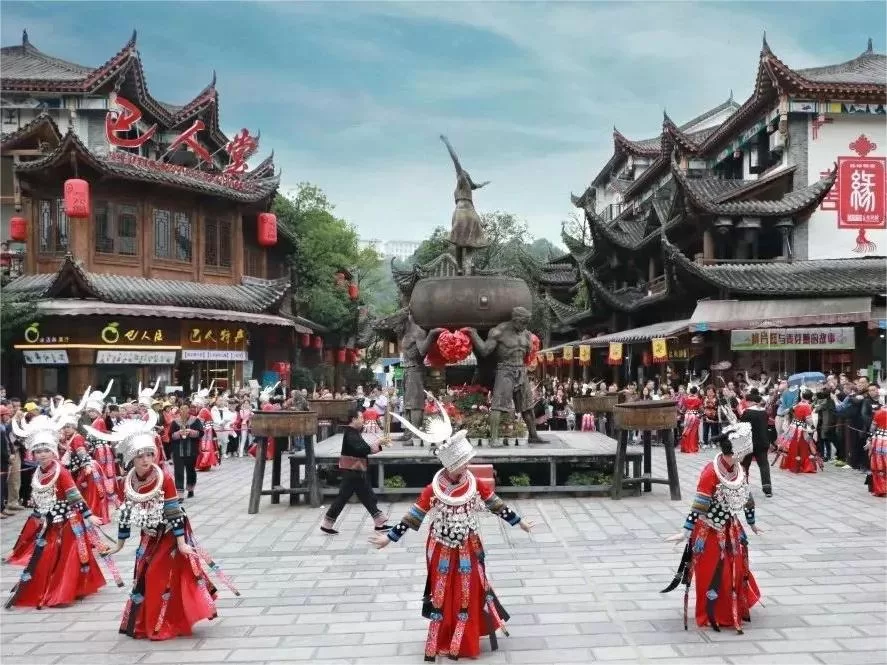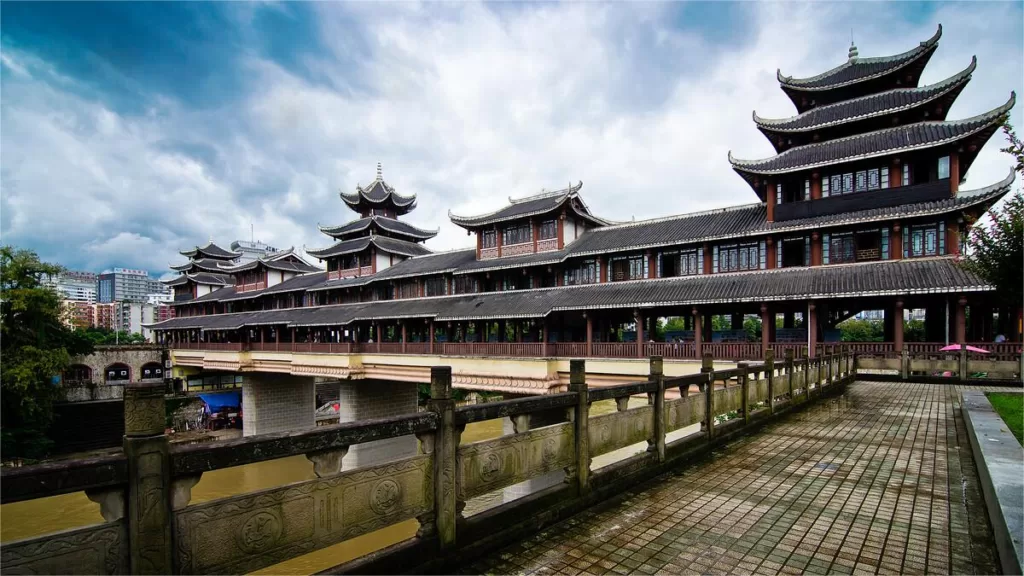Tujia Daughter City - Bilhete, horário de funcionamento, localização e destaques


Tujia Daughter City (土家女儿城) in Enshi combines ancient architecture with Tujia stilt houses, showcasing the rich cultural heritage of the Tujia ethnic group. This vibrant destination features 300 shops, 500 themed guesthouses, 30 distinctive dining establishments, 40 delightful snack vendors, an 8,000-square-meter landscaped lawn, a 10,000-square-meter comprehensive sports center, and the indoor theatrical marvel, Daughter City Grand Theater. Additionally, it boasts Hubei province’s largest water park.
The streets of Daughter City are intricately designed, following the natural contours of the mountains and flowing with the water, paved with gray angular gravel. Daughter Street, positioned at the heart of the ancient city, serves as the representative thoroughfare. It is not only the bustling street of Daughter City but also one of the thriving commercial zones in Enshi, epitomizing the city’s economic dynamism. With its unique blend of ancient charm and modern amenities, Tujia Daughter City stands as a testament to the Tujia people’s traditions and customs while providing a lively and diverse experience for visitors.
Índice
- Informações básicas
- Localização e transporte
- Custom Displays in Tujia Daughter City
- Vlog about Enshi Daughter City
- Dicas úteis resumidas a partir de comentários
- Outras atracções da zona urbana de Enshi
Informações básicas
| Duração estimada da excursão | 1 - 2 horas |
| Preço do bilhete | Grátis |
| Horário de funcionamento | 24 horas por dia durante todo o ano |
| Número de telefone | 0086-0718-8028699 |
Localização e transporte
Tujia Daughter City is situated in the Qiliping area of Enshi City, Hubei Province, China. The precise address is 41 Ma’anshan Road. This cultural destination is located within the urban area of Enshi and serves as a showcase of Tujia ethnic traditions and customs.
To get there, Tourists can take bus 12, 28B, 31, 39, or 39B and get off at Nv’ercheng Stop (女儿城站)
Custom Displays in Tujia Daughter City
Shuai Wan Jiu (Smashing Bowl Wine)

“Shuai Wan Jiu” originates from ancient Tujia customs and was a ceremonial drink performed before Tujia sons and daughters went off to battle. According to folklore, in a certain era, two Tujia tribal leaders or brothers harbored grievances. In a bid for the survival and development of their people, they decided to reconcile. They drank together to signify future friendship and harmony. Once consumed, they shattered the bowls, symbolizing the end of grievances and showcasing their magnanimity and boldness.
Bai Shou Wu (Hand Gesture Dance)

The “Bai Shou Wu” (Hand Gesture Dance) has multiple origins. One belief is its roots in religious rites and ancestral veneration. Tujia people deeply respect their ancestors and honor their leaders. To commemorate their achievements, they created this dance. Another theory links it to wartime activities, where legends tell of leaders using dance and song to boost morale or drive away homesickness among troops. Following victorious battles, this dance transitioned into a folk tradition. Additionally, some attribute it simply to the Tujia people’s inherent love for song and dance, considering it an artistic expression for self-entertainment. Lastly, it’s speculated that ancient Tujia ancestors utilized hand gestures for physical conditioning against natural elements or invasions, evolving gradually into the elaborate Hand Gesture Dance.
Tujia Daughter’s Festival

Often referred to as the Eastern Valentine’s Day or Tujia Valentine’s Day, Tujia Daughter’s Festival typically spans from the 7th to the 12th day of the lunar calendar’s 7th month. Originating in the Enshi region, particularly around Shihuiyao and Dashanding area, it has evolved into a regional ethnic festival. A distinctive feature of this festival is its use of songs as a medium for autonomous mate selection. Young maidens, as well as married women, participate to find potential partners or meet with past lovers, expressing their feelings through song.
During the Daughter’s Festival, young women dress in their most beautiful attire, layering garments with varying lengths – longer ones inside and shorter ones outside, each layer visible. They adorn themselves with their finest gold and silver jewelry, creating a dazzling spectacle.
Tujia Cry Marriage

Another intriguing Tujia custom showcased in the city is the “Tu Jia Zu Ku Jia” or Tujia Cry Marriage. When a Tujia daughter is to be married, she must display the ability to cry in a touching and moving manner, a practice known as “cry marriage.” A girl who cries eloquently is regarded as an intelligent and capable bride. Tujia girls begin learning this art of crying from the age of twelve or thirteen. In the past, those who couldn’t cry were not allowed to marry. The climax of cry marriage occurs on the day before the bride leaves her family. Friends and relatives gather to offer congratulations and bid tearful farewells. The bride’s family invites nine of her best unmarried friends to accompany her in the crying ritual, creating an emotional and memorable farewell scene.
Vlog about Enshi Daughter City
Dicas úteis resumidas a partir de comentários
Experience Shuaipan Wine: Inside the restaurants, you can experience the tradition of Shuaipan wine, where bowls are ceremonially smashed. However, be cautious during this experience to avoid injury from any glass shards.
Explore the Snack Street: Tujia Daughter City features a snack street where you can explore various local delicacies. However, be aware that due to the high volume of visitors, the snacks may be relatively common in taste. It tends to be crowded, so if you enjoy bustling environments, it’s worth a visit. However, it might be best to avoid visiting during the summer months due to the heat.
Rent Ethnic Costumes for Photos: Many studios within Tujia Daughter City offer the opportunity to rent ethnic costumes for photoshoots. The package prices are similar across different studios, and hiring a photographer can make the process more convenient.
Evening Performances: The highlight of Tujia Daughter City is the evening performance, which starts promptly at 7:30 PM. This performance depicts the traditional Tujia customs and rituals related to courtship and marriage. There’s no need to purchase tickets for the show.
Try Kàng Yàng Yù (炕洋芋): Don’t miss the chance to taste Kàng Yàng Yù, a local delicacy made from Enshi’s small potatoes. It’s renowned for its delicious flavor and is a must-try when visiting Tujia Daughter City.
Outras atracções da zona urbana de Enshi

Cidade de Enshi Tusi

Museu da Prefeitura Autónoma de Enshi Tujia e Miao

Enshi Fengyu Bridge
Atracções de Enshi, Vida local em Hubei